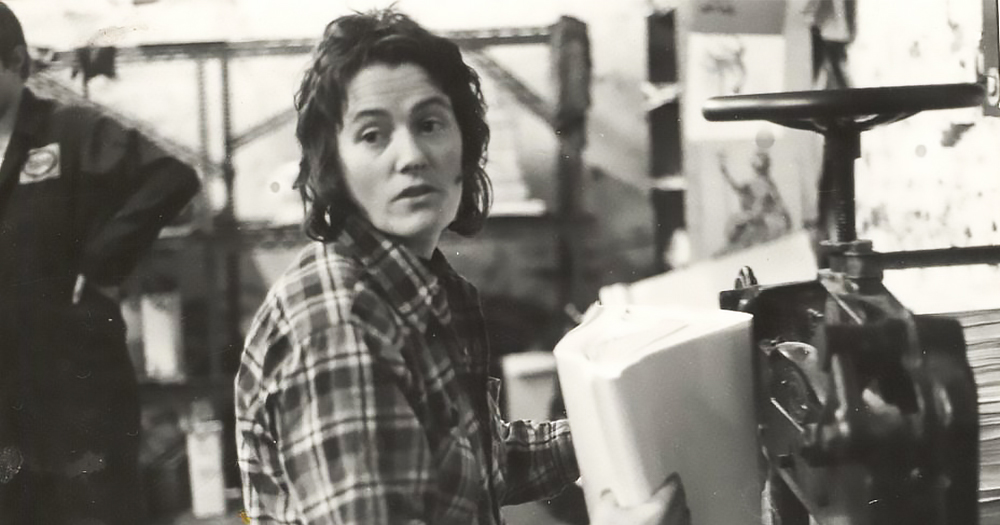Irish-born activist Luchia Fitzgerald changed the face of Manchester’s gay liberation movement alongside her former partner Angela Cooper. Together, they spent a lifetime fighting for the rights of women and LGBTQ+ people through their work with the Amazon Women’s Press and the Women’s Liberation Centre among many other things.
Both Fitzgerald and Cooper are the daughters of single mothers in Catholic Magdalene homes. Fitzgerald described her childhood in Ireland as abusive in both an emotional and physical sense.
At the time she was living with her grandmother before she ran away to Manchester as a teenager in 1961.
“She found out I was a lesbian, basically, and she was threatening to put me into an asylum. She used to beat the daylights out of me,” she told the Manchester Evening News.
Although Manchester provided some freedom, it was by no means perfect. Homosexuality was still illegal and would only be partly decriminalised six years later.
Luchia ended up living on the street and, after a run-in with the police, she was sent for a lobotomy. A lobotomy is a drastic form of brain surgery that was believed to be a ‘cure’ for homosexuality at the time.
“The psychiatrist explained what they were going to do and it was appalling. I was still a Catholic, and the questions were so bad and rude and dirty I started getting suspicious,” she said. “I got up and pinned him to the big mahogany table and ran.”
It wasn’t until 1971 that Fitzgerald met Cooper in one of the few gay bars at the time – the Picador club. While their first meeting sparked their romantic relationship, it would also lead to a lifelong political partnership.
Cooper was adopted from St Theresa’s home, and while she was raised Catholic, she said she always knew she was gay.
“There wasn’t a word at the time, but I knew it was sinful and I had to hide it. Into my teens, I already knew I was different,” she said.
They established the Manchester branch of the Gay Liberation Front and solidified their activist status. They’d go around the city and use yellow paint to write ‘lesbians are everywhere’ on bridges.
At the same time, both of them had moved into Manchester’s Women’s Liberation Centre, where they would live for the next five years. The centre was always busy and the two women would offer services such as pregnancy tests and helplines for women who had suffered domestic violence or rape.
Thanks to a donation from a local solicitor, they were able to set up the city’s first women’s refuge – also making it only the second one in the country.
Their activism continued well into the ‘80s – where they managed to organise a massive demonstration against Section 28 of the Local Government Act.
Section 28 was brought in by Margaret Thatcher’s Conservative government in 1988 and it banned the teaching of same-sex relationships in schools. 20,000 people marched through Manchester in opposition to the legislation.
“It created a whole new generation of activists,” Cooper said. “It’s fabulous now to see youngsters in the Village and at Pride all enjoying themselves now. It makes you think it was all worthwhile and I’m glad we were part of it.”
It was their amazing story that made them the subject of a short film, Invisible Women, which opened New York Pride 2019. The couple made a brief appearance on a BBC4 programme celebrating the 50th anniversary of the partial decriminalisation of homosexuality.
The programme’s producer, Joe Ingham, knew there was so much more to their story and got back in touch with them for the film. So far, the film has been shown in 11 countries and it even won the best international short in 2019 at Dublin’s LGBTQ+ Film Festival, Gaze.
Today, both Fitzgerald and Cooper, now 72 years-old and 69 years-old respectively, are still fighting for the rights of the LGBTQ+ community and women.
“We’re trying to pass on that mantle to the younger generation because as we all know, it’s getting more and more right-wing everywhere,” Fitzgerald said.
Though the film mainly deals with the couple’s political activism in the 1980’s, it’s clear that Fitzgerald is still as fiercely political as ever. She emphasised how being a gay liberation activist is a constant battle.
“I believe with every bone in my body that if there’s something that needs doing let’s get it done,” she said. “So I’m never done. No, the fight never stops. It really doesn’t. It never stops.”
© 2020 GCN (Gay Community News). All rights reserved.
Support GCN
GCN is a free, vital resource for Ireland’s LGBTQ+ community since 1988.
GCN is a trading name of National LGBT Federation CLG, a registered charity - Charity Number: 20034580.
GCN relies on the generous support of the community and allies to sustain the crucial work that we do. Producing GCN is costly, and, in an industry which has been hugely impacted by rising costs, we need your support to help sustain and grow this vital resource.
Supporting GCN for as little as €1.99 per month will help us continue our work as Ireland’s free, independent LGBTQ+ media.

comments. Please sign in to comment.